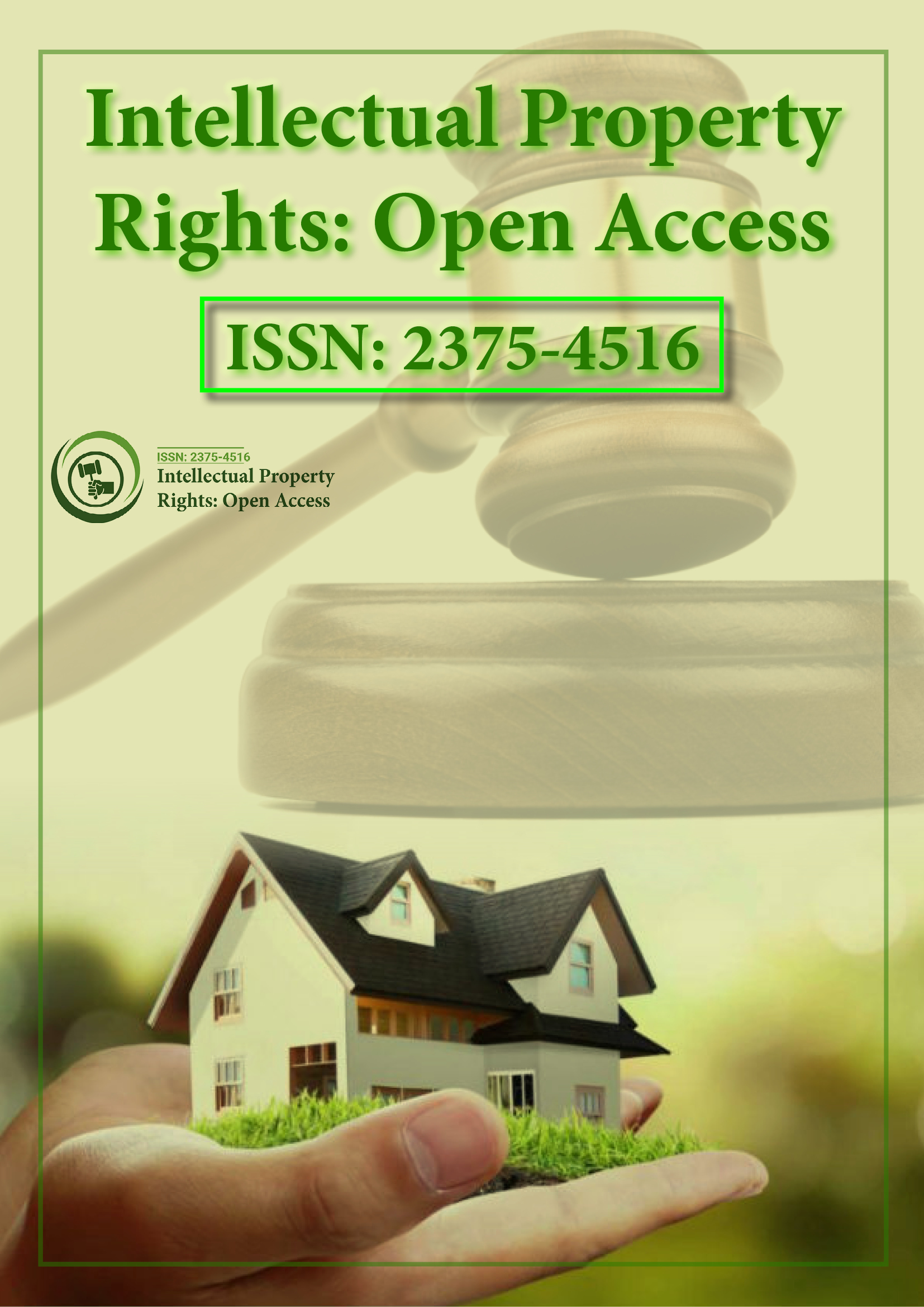Indexed In
- Open J Gate
- RefSeek
- Hamdard University
- EBSCO A-Z
- OCLC- WorldCat
- SWB online catalog
- Publons
Useful Links
Share This Page
Journal Flyer

Open Access Journals
- Agri and Aquaculture
- Biochemistry
- Bioinformatics & Systems Biology
- Business & Management
- Chemistry
- Clinical Sciences
- Engineering
- Food & Nutrition
- General Science
- Genetics & Molecular Biology
- Immunology & Microbiology
- Medical Sciences
- Neuroscience & Psychology
- Nursing & Health Care
- Pharmaceutical Sciences
Perspective - (2023) Volume 11, Issue 3
Process and Significance of Copyright Registration in Intellectual Property Rights
Sheen Jon*Received: 17-Aug-2023, Manuscript No. IPR-23-23330; Editor assigned: 21-Aug-2023, Pre QC No. IPR-23-23330 (PQ); Reviewed: 04-Sep-2023, QC No. IPR-23-23330; Revised: 11-Sep-2023, Manuscript No. IPR-23-23330 (R); Published: 19-Sep-2023, DOI: 10.35248/2375-4516.23.11.239
Description
Within the expansive scope of creative expression, copyright protection functions as the guardian, constructing a barrier safeguarding the intellectual assets of artists, authors, musicians, and trailblazers. Understanding the significance of copyright registration is essential for safeguarding one's creative endeavors in the modern world. This paper delves deep into the intricate scope of copyright registration, unraveling its significance, the process involved, and its far-reaching implications.
Understanding copyright
Copyright is a legal right that grants the creator of original work exclusive rights to its use and distribution, usually for a limited time, with the intention of enabling the creator to receive compensation for their intellectual investment. These rights often encompass literary, artistic, musical, and dramatic works, as well as software, and even architectural designs. Copyright does not protect ideas, concepts, systems, or methods of doing something, but it does protect the way these ideas are expressed.
The significance of copyright registration
Legal protection and recognition: Registering a work with the appropriate copyright office provides legal evidence and public notice of ownership. In case of a legal dispute, having a registered copyright strengthens the creator's position in court.
Deterrence against infringement: Copyright registration acts as a deterrent against potential infringers, as it establishes a clear record of ownership. Potential violators are less likely to challenge the rights of a registered copyright holder.
Financial benefits: Copyright registration is often a prerequisite for pursuing damages in case of infringement. Registered works are eligible for statutory damages and attorney's fees, providing a stronger financial incentive for legal action.
Global protection: While copyright protection is generally territorial, many countries honor international copyright treaties such as the Berne Convention, ensuring that creators' rights are recognized globally. Registration can facilitate protection in multiple jurisdictions.
The copyright registration process
Preparation: Before initiating the registration process, it is vital to gather all relevant materials, including the work itself, detailed descriptions, publication dates, and authorship information. Proper documentation ensures a smooth application process.
Choosing the right office: Depending on the type of work, there are different copyright offices responsible for registration. For instance, literary works are registered with the U.S. Copyright Office, while patents and trademarks have distinct offices overseeing their registration processes.
Application submission: The application process typically involves filling out forms, paying a fee, and submitting copies of the work. In some cases, a deposit of the actual work is required. Online application systems have streamlined this process, making it more accessible to creators worldwide.
Review and approval: Once the application is submitted, it undergoes a review process by copyright examiners. In some cases, additional documentation or clarifications might be requested. Once approved, the copyright registration is granted.
Maintenance and renewal: Copyright protection is not eternal. The duration of copyright protection varies depending on the country and type of work. Creators must keep track of the expiration date and, if necessary, apply for renewal to extend the protection period.
Copyright in the digital age
The digital era has revolutionized the way creative works are produced, distributed, and consumed. While it has opened new avenues for artists and creators, it has also posted significant challenges regarding copyright infringement. Digital Rights Management (DRM) technologies and evolving copyright laws aim to strike a balance between protecting creators' rights and ensuring the public's access to knowledge and culture.
Conclusion
In the intricate mosaic of creativity, copyright registration serves as an important thread, weaving together legal protection, recognition, and financial benefits for creators. Understanding the significance of this process is fundamental for every artist, writer, musician, and innovator aiming to safeguard their intellectual property.
As the creative landscape continues to evolve, staying informed about copyright laws and registration procedures is essential. By embracing the shield of copyright protection, creators empowers themselves, ensuring that their artistic legacy remains intact and respected in the ever-changing tides of the creative world.
Citation: Jon S (2023) Process and Significance of Copyright Registration in Intellectual Property Rights. Intel Prop Rights. 11:239.
Copyright: © 2023 Jon S. This is an open access article distributed under the terms of the Creative Commons Attribution License, which permits unrestricted use, distribution, and reproduction in any medium, provided the original author and source are credited.
